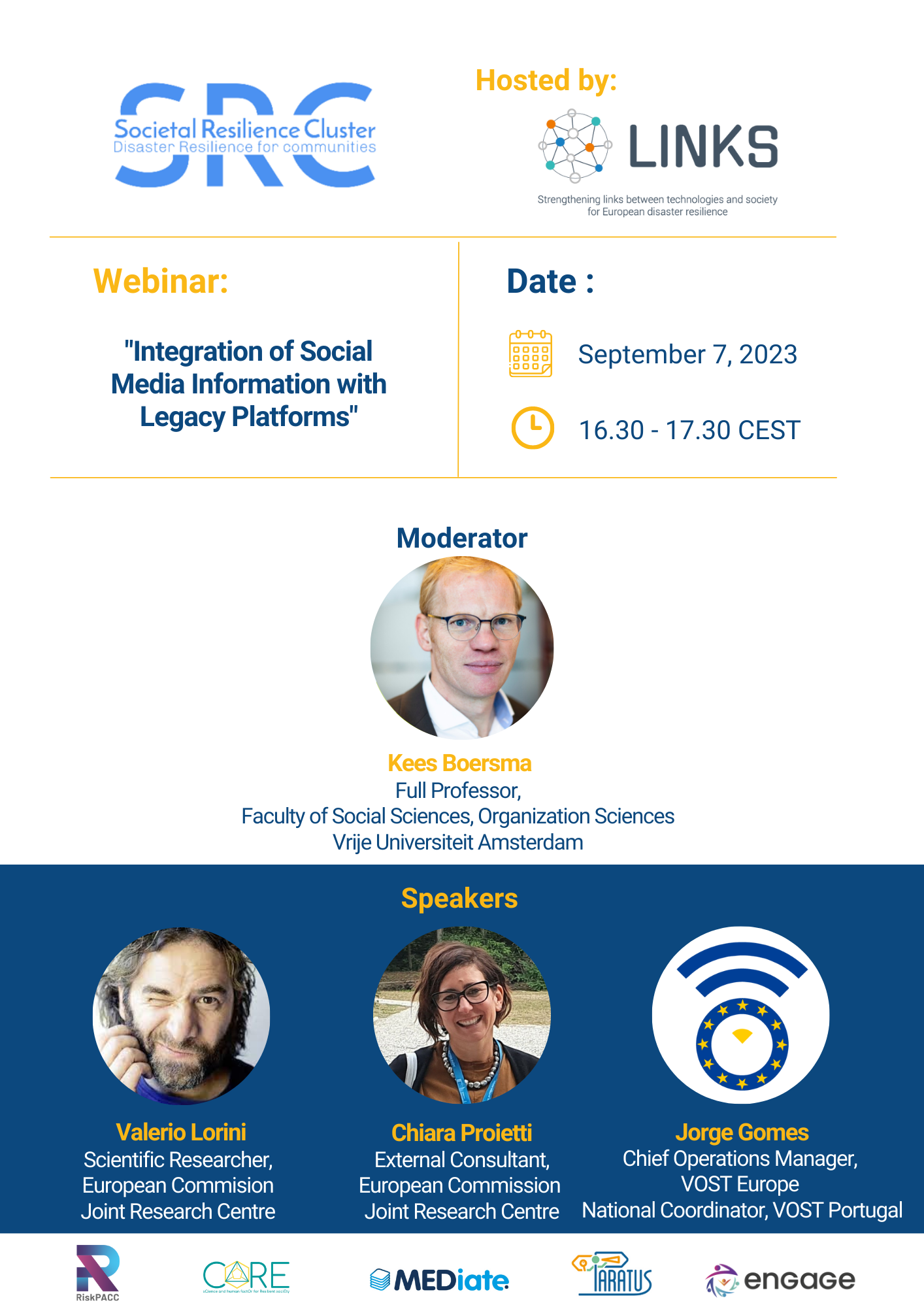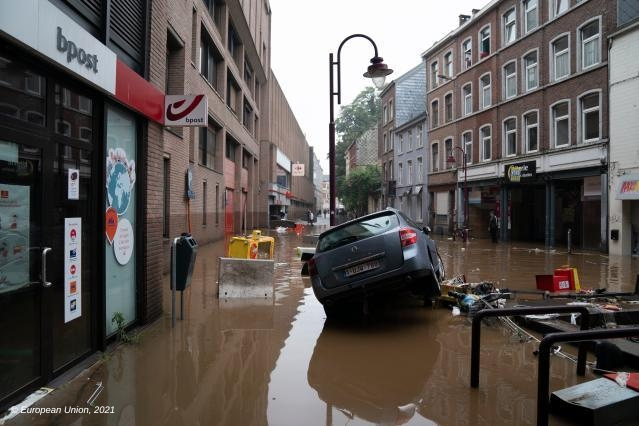Are climate change and drought connected? We asked Richard Damania, the World Bank’s Chief Economist for Sustainable Development, and two experts from the Bank’s Sustainable Development unit: Senior Economist Esha Zaveri and Senior Climate Change Specialist Nathan Engle.
News
An estimated 333 million children globally – or 1 in 6 – live in extreme poverty, according to new UNICEF-World Bank analysis released today.
As the Earth's human population grows, greenhouse gas emissions from the world's food system are on track to expand.
Food prices may be soaring but we’re still not paying the true cost of food.
The Role of Social Media in Disaster Resilience: Integration of Social Media Information with Legacy Platforms.
Webinar will take place on 7 September at 4.30 p.m. CEST.
The Societal Resilience Cluster of Horizon Projects is launching a series of webinars in 2023 on topics which focus on the strengthening of European disaster and crisis resilience.
Full details can be seen in the attachment and please register using the link: https://www.cmine.eu/events/122304

The coffee industry should step up the digitalisation of the value chain to get ready for the European Union (EU)’s Deforestation Regulation (EUDR) to maintain and expand exports to this bloc, according to the Việt Nam Trade Office in Belgium.
July 2023 available
Following the Joint Mission carried out by Indonesia and Malaysia to Brussels on 30-31 May 2023 and the follow-up visit of the European Commission to Indonesia and Malaysia on 26-28 June 2023, Indonesia, Malaysia and the European Union agreed to establish an Ad Hoc Joint Task Force (JTF) on European Union Deforestation Regulation (EUDR). The Kick-off Meeting of the Ad Hoc JTF was conducted on 4 August 2023 in Jakarta, Indonesia.
The Uae COP28 chairmanship launched its Agenda on Food systems and agriculture part of the work to shape the action agenda leading up to this year's climate conference.
The Bioeconomy Changemakers Festival, jointly organised by the European Commission and the EU Bioeconomy Youth Ambassadors, aims to engage youth as drivers of the transformative change and boost the bioeconomy innovation ecosystem. It will take place between 11 and 17 March 2024 in various location across EU Member States, including a high-level main event in Brussels. Interested companies and institutions can now apply for organising satellite events.
The urgent need for systemic change in our food systems has never been more apparent.
The integrated process of information gathering, analysis, planning, decision making, allocation of resources and formulation and enforcement of fishery regulations by which the fisheries management authority controls the present and future behaviours of the interested parties in the fishery, in order to ensure the continued productivity of the living resources.
Following several stakeholder consultations, the European Commission adopted the delegated Regulation, pursuant to Article 28(5) of the Renewable Energy Directive. This delegated act defines a methodology allowing economic operators to calculate the contribution of biofuels and biogas in blended transport fuel. Calculations are done in the context of the EU renewable energy target in transport, in line with the sustainability and greenhouse gas emissions saving criteria and low indirect land-use change-risk criteria.
On 29 June 2023, the EU Regulation on deforestation-free supply chains entered into force, stepping up EU’s engagement with producer and consumer countries to prevent deforestation and forest degradation in any part of the world while promoting sustainable consumption. Operators and traders will have 18 months to implement the new rules covering palm oil, cattle, soy, coffee, cocoa, timber and rubber as well as derived products. The list of commodities that are covered will be regularly updated taking into account the evolution of the deforestation.
With a joint Communication, the European Commission and the High Representative clarified how the EU will address the growing impact of new threats related to climate change and environmental degradation on our society and our security operations. The EU aims to better integrate the climate, peace and security nexus in the EU's external policies, with a set of concrete actions across the entire spectrum of data, policies, missions, defence, and cooperation with third partners. The concept of food security and the sustainable management of key natural resources are an integral part of this strategy.
On 5 July 2023, the Commission presented the 2023 Strategic Foresight Report, on how to put ‘sustainability and people's wellbeing at the heart of Europe's Open Strategic Autonomy', identifying six key social and economic challenges and ten concrete actions to achieve a successful transition. The Communication builds on the JRC Report "Towards a fair and sustainable Europe 2050: Social and economic choices in sustainability transitions", where the crucial role of the bioeconomy is highlighted in one of the scenarios of a sustainable EU 2050.
The INFORM 2023 report emphasizes a substantial rise in global crisis risk over the past decade that culminates in the past two years.
A surge in crises and their severity in 2022
In 2022, the number of crises increased by 18.5%, rising from 115 in January to 136 in December. During the same period, the global average severity score of active crises saw a slight decrease due to the low severity of several new crises.
Ten crises, including the drought in Kenya, violence in Sudan's Darfur and Kordofan regions, the conflict in Ukraine, and cyclone seasons in Madagascar and Mozambique, started or deteriorated in 2022. Displacement situations also worsened, particularly in Costa Rica, Ecuador, Libya, and Malaysia.
Looking ten years back from 2022 (using the INFORM Risk tool), the report also finds that there has been a global increase in the risk of humanitarian crises. Despite improvements in coping capacity, however they were not enough to keep pace with the large increases in the number of people exposed to hazards and their vulnerability .
Climate change and socio-economic trends
Climate change and socio-economic changes are expected to continue increasing the risk of crises. Low-income countries in Africa, Central and South America, and Western and Southern Asia will likely be most affected.
INFORM Climate Change – a specific INFORM tool - looks at the future risk of crisis taking into account two scenario combination that represent significantly different possible futures. These are considered plausible by researchers and are referred to as the optimistic and pessimistic scenarios for greenhouse gas emissions and socio-economic development.
Under the pessimistic scenarios , the results show more than 1.6 billion people might live – by 2050 - in countries with large increases in the risk of humanitarian crises and disasters. Even in more optimistic scenarios, the number of people impacted by crises and the associated aid costs will significantly increase by 2050.
Looking ahead and anticipating crises
The 2023 INFORM report underscores the importance of proactive actions and strategic investments on climate mitigation, climate adaptation, disaster risk reduction and sustainable development , especially for regions that have struggled to reduce crisis risks in the past and will have even more difficulties to cope with the impact of climate change and socio economic trends.
The report highlights the need for a global collaborative effort to build resilience and reduce vulnerability, particularly in low and lower-middle income countries if they don’t (have the means to) reduce risk.
By leveraging the insights and data from the INFORM Report, countries, humanitarian organizations, and stakeholders can make informed decisions, prioritize resources, and implement effective strategies to mitigate future risks. Actions in climate mitigation, climate adaptation, disaster risk reduction and sustainable development are essential.

As part of the EU soil strategy for 2030, the EU proposed a new Soil Health Law to help achieve healthy soils by 2050. The proposal puts in place a solid and coherent monitoring framework, combining data from multiple sources to support innovative and evidence-based solutions in farming practices. In addition, it requires EU Member States to define positive and negative practices for soil management as well as regeneration measures based on national soil health assessments, useful to inform LULUCF, CAP and water management policies. Finally, the proposal requests that Member States address soil contamination issues, applying the ‘polluter pays’ principle.
A recent study conducted under the European Union's PESETA IV project explored the potential effects of climate change on river flooding and the associated damage across Europe.
The researchers have employed a method of refinement that involves statistical modelling of the predicted changes in damage, based on fluctuations in the Global Mean Surface Temperature (GMST).
By making certain assumptions, these predictions can be used to estimate how much damage might vary between any two periods of time for any given GMST scenario. This information can then be used to modify many of the metrics that insurance companies use to measure flood risk, such as average annual losses, exceedance probabilities, and yearly loss tables.
The study shows how quickly or slowly the predicted flood damage changes in response to changes in the Global Mean Surface Temperature (GMST). For example, if the GMST increases by 1 degree, the rate of change shows how much the predicted flood damage is expected to increase or decrease. This is valuable information that insurance companies can use to adjust their risk models and financial forecasts.

